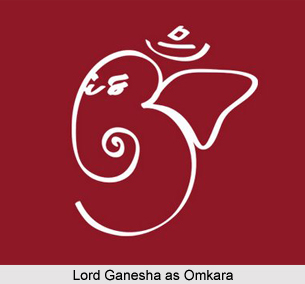 Lord Ganesha is often described in the form of Omkara (Om) or Aumkara. The outward shape of Ganesha`s body resembles the sacred syllable which signifies the Bija Mantra. Thus the elephant-headed deity is regarded as the physical manifestation of the entire Universe. Furthermore the images of Lord Ganesha in south India also resemble Omkara form.
Lord Ganesha is often described in the form of Omkara (Om) or Aumkara. The outward shape of Ganesha`s body resembles the sacred syllable which signifies the Bija Mantra. Thus the elephant-headed deity is regarded as the physical manifestation of the entire Universe. Furthermore the images of Lord Ganesha in south India also resemble Omkara form.
Omkara is defined as the form of Vedas according to saint Jnanesvara. Ganesha is considered as the Lord of wealth and knowledge. The popular Hindu god has the form of the Vedas. Moreover the letters of the Vedas represent his immaculate form. The proper interpretation signifies the beauty of His body. The eighteen Mahapuranas are regarded as the ornaments of deity and the composition of the verses is His divine lustre.
The striking passages of the Puranas represent the complexion of Ganesha`s body. The sacred scriptures and the verses are the waist band of the Lord and the various tattvas of the important religious text are considered as the glimmering chariots. The wisdom of Sage Veda Vyasa and other sages are the small bells on His waist band. The Sada Darsanas indicates the six arms of Lord Ganesha, holding specific attributes in each hand.
This article is a stub. You may enrich it by adding more information to it. You can send your write-up at content@indianetzone.com




















